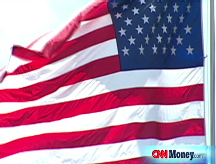Governors disagree on bailout
Governors testify before House committee on economic recovery and job creation, butting heads over the need for a bailout.
NEW YORK (CNNMoney.com) -- Governors and mayors disagreed Wednesday on whether the U.S. government should stimulate the economy by bailing out states with battered budgets.
In testimony before the House Ways and Means Committee in Washington, D.C., Gov. David Paterson of New York and Mayor Douglas Palmer of Trenton, N.J., called on Congress to pass another stimulus package.
"As part of a comprehensive second economic stimulus package, states need direct and immediate fiscal relief," Paterson said, urging Congress to pass a bill before adjourning for the year.
Earlier this year Congress passed a $168 billion relief package that gave businesses tax incentives and offered tax filers about $100 billion in rebates.
The New York governor reiterated statements he made Tuesday that his state faces a $47 billion deficit by 2012 because of overspending, the Wall Street meltdown and the recession. Paterson repeated his projection that 160,000 New Yorkers will lose their jobs as a result of the recent downturn.
Paterson, a Democrat, said that New York needs fiscal support for road, bridge and water projects. He added that an expansion of food stamp benefits would also help to bolster the economy.
Palmer, a Democrat who is the former president of the U.S. Conference of Mayors, said the Wall Street meltdown has had a "profound effect" on Trenton.
Trenton relies heavily on support from the state of New Jersey, which is facing a $4 billion budget deficit. As a result, Palmer said, the city is cutting 10% of its workforce, including police officers and firefighters, but still faces a potential 43% jump in its tax rate.
"In the words of the great poet John Lennon, 'Help! I need somebody," said Palmer. "We need not only hope, but resources, to put people back to work."
But Mark Sanford, the Republican governor of South Carolina, shot down the merits of stimulus for cities and states from the National Governors Association, doubting whether it would work and decrying the notion of putting the nation further into debt.
"In fact, if this $150 billion stimulus package is passed, this year's budget deficit could top $1 trillion - adding to the over $10 trillion national debt and making it 70% of a roughly $14 trillion economy," said Sanford. "That would be the highest level since the early 1950s when the nation was still paying down the accumulated costs of World War II."
Sanford's spokesman Joel Sawyer told CNNMoney.com that the governor, in referring to a $150 billion bailout proposal, was referring to a recent request made by House Speaker Nancy Pelosi, D-Calif.
Rep. Charles Rangel, D-N.Y., chairman of the House Ways and Means Committee, supports the idea of a stimulus bill. He urged bipartisan support for "assistance for local and state governments, as we have been able to do with our banking and finance industry."
Rangel and other committee members grilled Sanford for opposing a federal stimulus package, saying that the economy needs a federal cash injection. But Sanford said that states and municipalities should take responsibility for their own financial affairs, making budget cuts instead of relying on federal support.
"Its always easier to spend somebody else's money," said Sanford.
So far this year, the economy has shed 760,000 jobs nationwide and the unemployment rate is 6.1%, a five-year high. In an attempt to grease the skids towards economic recovery, Congress approved a $700 billion bailout bill earlier this month, in part to buy bad mortgage-related investment from Wall Street to free up lending and thaw the credit freeze. ![]()


